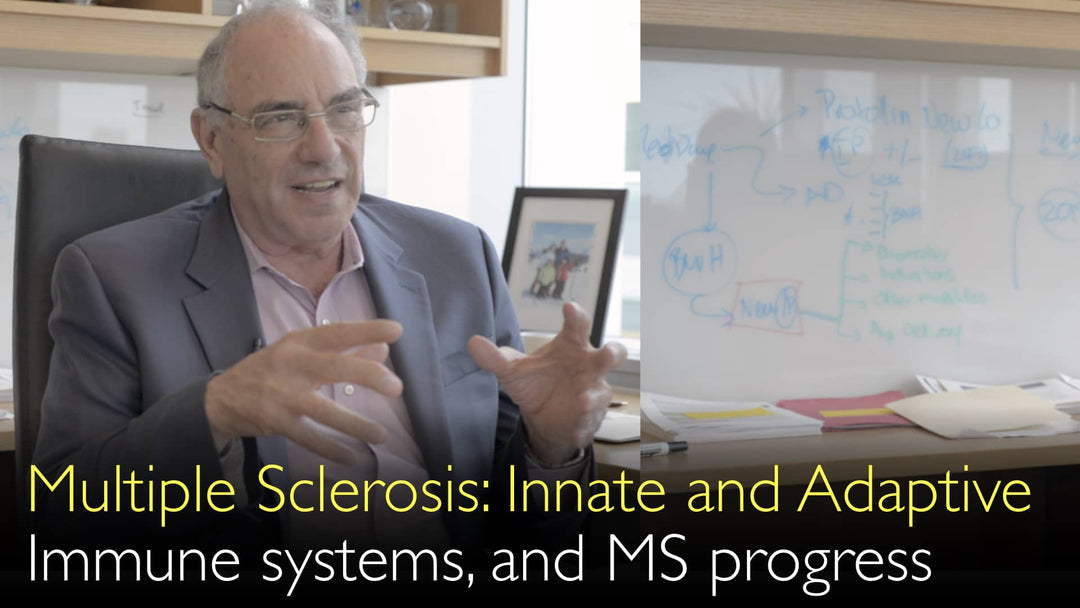Leading expert in multiple sclerosis, Dr. Howard Weiner, MD, explains the critical interaction between the innate and adaptive immune systems in MS. He details how the adaptive system drives acute attacks while the innate system, particularly microglial cells, fuels long-term disease progression. Dr. Howard Weiner, MD, discusses the sobering statistic that 65% of patients progress to secondary progressive MS and highlights the need for treatments targeting the innate immune system.
Understanding the Dual Immune System Roles in Multiple Sclerosis Pathogenesis
Jump To Section
- Two Immune Systems in Multiple Sclerosis
- Role of the Innate Immune System in MS Progression
- MS Progression to Secondary Progressive Phase
- MS Treatment Implications for Immune Targets
- Future Directions in MS Therapy and Monitoring
- Full Transcript
Two Immune Systems in Multiple Sclerosis
Multiple sclerosis involves a complex interplay between two distinct arms of the immune system. Dr. Howard Weiner, MD, a world-renowned MS expert, clarifies their distinct roles. The adaptive immune system reacts quickly and is primarily responsible for the acute attacks seen in relapsing-remitting MS.
In contrast, the innate immune system operates on a slower, more chronic timeline. This system's activity is closely linked to the underlying disease progression and neurodegeneration that characterizes MS.
Role of the Innate Immune System in MS Progression
The innate immune system becomes a dominant driver of disability in multiple sclerosis over time. Dr. Howard Weiner, MD, emphasizes that this arm of immunity involves the activation of microglial cells within the central nervous system. These resident immune cells of the brain contribute to a sustained inflammatory environment.
This chronic inflammation is a key mechanism behind the steady worsening and accumulation of disability, even in the absence of dramatic relapses. Dr. Weiner's research has been pivotal in highlighting this crucial pathway.
MS Progression to Secondary Progressive Phase
A significant majority of multiple sclerosis patients eventually transition to a more severe disease course. Dr. Howard Weiner, MD, cites a critical statistic: up to 65% of individuals with relapsing-remitting MS will progress to secondary progressive MS (SPMS). This phase is notably more difficult to treat effectively.
Dr. Howard Weiner, MD, explains that this clinical progression signifies a shift in the underlying immunology. As the disease advances, the role of the innate immune system becomes increasingly involved and prominent.
MS Treatment Implications for Immune Targets
Modern multiple sclerosis medications are designed to target specific components of the immune response. Dr. Howard Weiner, MD, notes that different medications selectively target different limbs of the immune system. Many current therapies are highly effective at suppressing the adaptive immune system to prevent relapses.
However, Dr. Weiner points out that most existing medications do not necessarily work primarily on the innate immune system. Some may have joint effects, but a clear therapeutic gap remains for directly modulating this chronic driver of progression.
Future Directions in MS Therapy and Monitoring
The future of multiple sclerosis care involves a more nuanced approach to immune modulation. Dr. Howard Weiner, MD, suggests that with better treatments for the relapsing-remitting phase, fewer patients may transition to progressive forms of the disease. This could result in a population with "less progressive MS."
A critical need exists for new medications that work specifically on the innate immune system. Furthermore, Dr. Weiner stresses the importance of measuring both arms of the immune system to guide therapy and predict outcomes, a concept Dr. Anton Titov, MD, explored in the discussion.
Full Transcript
Dr. Anton Titov, MD: You are a world-renowned expert in multiple sclerosis. In particular, you made seminal discoveries about the role of the innate immune system. Could you describe how the two arms of the immune system, the innate immune system and the adaptive immune system, work in the genesis of multiple sclerosis?
Dr. Anton Titov, MD: What is the role of the innate immune system in multiple sclerosis?
Dr. Howard Weiner, MD: The adaptive immune system may be the immune system that reacts the quickest. This probably is related to multiple sclerosis attacks. The innate immune system maybe is the slower immune system. It could relate to multiple sclerosis disease progression. It involves microglial cells in the brain.
Dr. Howard Weiner, MD: Different medications target different limbs of the immune system. We need to measure both arms of the immune system. The innate immune system is very important for long-term multiple sclerosis progression.
Dr. Anton Titov, MD: In one of the articles you mentioned that up to 65% of multiple sclerosis patients eventually progress from relapsing-remitting form of multiple sclerosis to the secondary progressive multiple sclerosis phase. This is more difficult to treat. Does that signify the increase in the role of innate immune system as that progression happens?
Dr. Howard Weiner, MD: The innate immune system becomes more involved as the multiple sclerosis progression happens. With better treatments for relapsing-remitting multiple sclerosis there may be less and less patients that become progressive. They have less progressive multiple sclerosis.
Dr. Anton Titov, MD: What are examples of new multiple sclerosis medications?
Dr. Anton Titov, MD: Maybe some are still in development. Medications that work in particular on an innate immune system for patients with multiple sclerosis?
Dr. Howard Weiner, MD: Most of the medications don't necessarily work on the innate immune system. Some medications have joint effects. It is more about measuring the innate immune system in multiple sclerosis patients.
Up to 65% of relapsing-remitting multiple sclerosis patients progress eventually to secondary progressive phase. How changes in immune system function affect multiple sclerosis progress?







